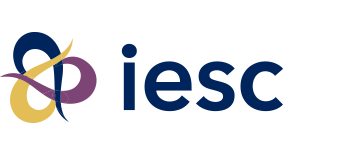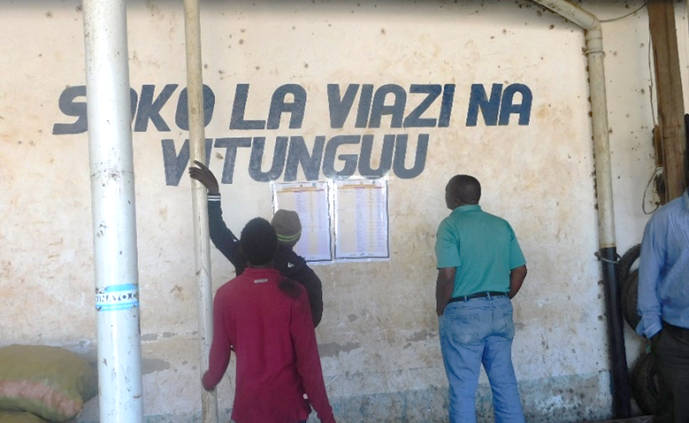Business License Road Map Praised by Local Business Sector
Entrepreneurs reading the business license roadmap at the Iringa town marketplace
Entrepreneurs from the Tanzanian city of Iringa expressed their appreciation for the newly improved, transparent, and streamlined process for officially registering their businesses. With the assistance of the USAID Feed the Future Tanzania Enabling Growth through Investment and Enterprise (ENGINE) Program, the Iringa Municipal Council reviewed and revised the municipality’s business license policies and processes with a new roadmap, which is now posted and publicly available in the municipality’s commercial areas, as well as on its website. This has removed the confusion and delays many business owners have recently faced while attempting to renew their business licenses.
According to the local Trade Officer, Mr. Thabit Muba, the Iringa Municipal Council has observed an increase in revenue collected from business license payments since the improvements were made. In 2018, 2,660 licenses were issued or renewed, and another 2,940 were issued or renewed in 2019. Revenue collection increased by 46 percent in the 2019 – 2020 fiscal year. Mr. Muba said one of the reasons for this increase is the easy access to various fee structures and procedures, which are easier to follow with the new comprehensive roadmap.
In 2017, Iringa’s council realized that they were experiencing low revenues and delays in payments for business licenses. This led them to request ENGINE’s support in documenting business license procedures and designing a fee schedule roadmap. In May 2017, ENGINE collaborated with staff from the council to review and document business license procedures and fee schedules. The process was conducted in accordance with the national Business Licensing Act No.25 from 1972.
“We are grateful to ENGINE’s support in ensuring our municipal council has a business license roadmap. ENGINE helped us to document the roadmap that includes a business fee structure and procedure to be followed and which has been produced and displayed at the marketplace and at the office of the Trade Officer. This has facilitated easy access to information regarding business licenses to all entrepreneurs in the municipality and on seeing this, the businesspeople are motivated to make timely payments for their business licenses”, stated Mr. Muba.
The newly developed roadmaps are on display in a local market area, at the Municipal Trade Officer’s office, and at the office of the Gangilonga Ward Executive Officer. They were also uploaded onto the local government authority’s website for easy accessibility and wider coverage.
“We no longer see people flocking to the Municipal Trade Officer’s office requesting information on the fees and procedures for making business license payments. This gives ample time for trade officers to work on other official assignments.”
Mr. Muba clarified that having roadmaps displayed at public places has increased public trust in the municipal council’s management as entrepreneurs can transparently observe all required procedures and fees. This has also removed opportunities for unnecessary fees sought by middlemen that claimed to be helping people get their business licenses.
Peter Ngwiso, a salesperson at the Ngwiso Shop, testified on these improvements and explained that contrary to the past, the process for renewing his shop’s 2019 business license was easy and smooth.
“This year our shop’s business license renewal process was shorter and completed within one day. Through reading the roadmap displayed at the marketplace, I knew all the procedures and visited the Trade Officer’s office with the right documents and payment already prepared. I hope my fellow businesspeople are similarly finding this knowledge useful”, Peter declared.
This success story is made possible by the support of the American people through the United States Agency for International Development (USAID). The contents are the sole responsibility of IESC and do not necessarily reflect the views of USAID and the United States Government.



